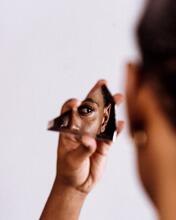“The World Should Not Define You”
Black Lives Matter: the world-shaking movement that highlights the racism, inequality, and discrimination Black people experience daily. Even today we are still fighting for the same rights that our ancestors fought for. We are standing up against hundreds of years of systemic oppression. We are still resisting the idea that Black bodies are less than. Black Lives Matter encompasses all Black bodies.
Even Black bodies with disabilities.
Let’s be honest and deal with the ugly truth. From the time Black bodies were taken from their native soil they have been viewed as property, and the value of that property increased based on how much work it could produce. In essence we were the farm machines before such iron machinery ever existed. Our value increased based on our ability to perform and produce. Men were more valuable than women because they could work harder and produce more. That is why Black women even now are trying to prove their value because we have always been seen at the very bottom of the list of valued bodies. This notion of Black production continues to harm Black bodies—especially those with disabilities.
Stories of Peril
Stories have been passed down regarding Black folks with disabilities born during chattel slavery. If a child was born with a disability and unable to produce for the master, the master saw no value in the child and the child was seen as a liability. Many mothers did what mothers do—they began to protect their children. Some chose to hide their child with a disability in the slave quarters so the master would not know the child existed. Others chose to teach the child some sort of skill to ensure that the master saw value in keeping the child. This notion of hiding the child and hiding the disability did not disappear, it just evolved.
To be Black and disabled adds an extra burden—the danger of being forgotten or pushed away because this world still teaches us that Black value comes from Black production.
This is where we get the persistent idea of “Don’t tell anyone about your sickness or disability.” It became the norm to hide perceived weaknesses in order to hold on to your value. Passed down from generation to generation, this secret-keeping turned into a source of shame. By making your disability a secret you were taught to be ashamed of how God made you.
I experienced this first-hand when my 93-year-old grandmother saw my daughter wearing orthotic braces on her legs, and she instructed me to forbid her from wearing them outside of the home. I informed my grandmother that my daughter, diagnosed with cerebral palsy, needed braces in order for her to learn to walk. My grandmother said, “Hush, child, don’t tell anyone something is wrong with her. Just let her wear them at home so people won’t see.” For the first time ever, I felt a sense of shame about her wearing the braces, although my daughter put them on with sheer joy because they were adorned with beautiful butterflies. If shame could come over me in that brief moment, what does it feel like to constantly feel the need to hide who you are?
Healing After Shame
If you are Black, the world already teaches that you are less than—or shall I say tries to teach you this, because we are now resisting this ignorant teaching. Then why would we as Black folks continue to do the same in our own communities? Why do many of us still hide disabilities and people with disabilities? Because we have not healed from the shame that was imposed on us at birth when we were born with Black bodies. This shame, this ordeal of trying to prove we are worthy, was instilled in each of us, not by our parents but by the world. So to be Black means you have been taught that you have to be smarter, work harder, be more talented, and earn more diplomas than you need and just be better at everything. To be Black and disabled adds an extra burden—the danger of being forgotten or pushed away because this world still teaches us that Black value comes from Black production.
Ultimate Belonging
So I write this to teach each of us: The world should not define you, your value, or your abilities. You are valuable because you are made in the image of God. And in God’s image came a Jesus who was resurrected with a disabled body, one with holes in his wrists and ankles. Yet that resurrected body carries the power of God.
It is time for Black churches to teach there is power in all bodies, no matter what the variety of abilities. It is time for Black churches to ensure that all bodies are valued and loved and belong. It is one thing to put in a ramp, but are you willing to change your attitudes so that all are truly welcome? I work to help faith communities see how they can become places of true belonging. I write for the little ones in butterfly orthotics who want to be seen as whole and not broken. I write for the boy with autism who needs to find his space, his friends who will love him just as he is. I write for the parent who is trying to create an inclusive world for their child. It is time for all of us to be proud of how the Creator made us, all of us, in the image of our God.
LaTonya McIver Penny is pastor of Belonging Fellowship congregation in Mebane, NC, and is Associate Director of Church Services at All Belong Center for Inclusive Education. A D.Min. graduate of Campbell University and an M.Div. graduate from Wake Forest University, she is also founder of Mary’s Grace, which advocates for compassionate treatment of children with disabilities.

